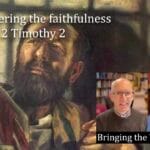The lectionary reading for the Seventh Sunday after Trinity in Year C is the Parable of the Rich Fool in Luke 12.13–21. It is one of several parables that is unique to Luke, and includes features that connect it with other Lukan parables. The video discussion of this passage can be found here (and is also linked below); the video discussion of the epistle, Colossians 3.1–11, can be found here (and is also linked below).
Since last week’s reading of Jesus’ teaching about prayer, things have moved on considerably. Since then, Jesus has been involved in a number of controversies and the sense of conflict has sharpened. Following the ‘Beelzebub’ controversy in Luke 11.14f, Jesus engages in some teaching about the sign of Jonah and the lamp of the body, but then (in a long chapter of 54 verses) falls into sharp dispute with some Pharisees and ‘teachers of the law’, pronouncing severe ‘woes’ against them. ‘Teacher, when you say these things, you insult us too’ (Luke 11.45). ‘Too right I do!’ he responds. Gentle Jesus, meek and mild—I think not!
In the first part of chapter 12, he continues to warn the jostling crowd against the influence of the Pharisees, and calls those following him to loyalty under pressure. All this material emphasises the idea that there are powerful forces, within us and without, which seek to draw us away from the path of discipleship, and that part of following Jesus is about making hard and determined choices to stay loyal.
This parable is introduced by an interjection from someone in the crowd (Luke 12.13). There is no particular need to think of this as a Lukan narrative artifice; he has already mentioned the crowds in Luke 12.1, and there is a clear sense that, whilst at times Jesus is teaching the crowd, and at others directing his words to his disciples, even then the crowd appear to be able to overhear what he is saying.
The question of inheritance was a pertinent one in Jesus’ culture; our knowledge of the socio-economic realities of the time indicate that inheritance was the primary source of wealth, since income generation in an agrarian economy was difficult and unreliable. (There is no little irony in the fact that, in the UK in the last 30 years, we have seen a similar shift to the importance of inheritance, primarily because of the soaring costs of housing.)
The question of inheritance was addressed in the OT, particularly in Deut 21.15–17 and Num 27.1–11 (interestingly, in the latter, ensuring that daughters were provided for from their father’s estate were there no sons)—and the assumption was that the elder son received a double portion. It is likely that this voice from the crowd was a younger son with no-one to speak for him, and as was common in Graeco-Roman culture, he appeals to an authority figure to plead his case. He knows the outcome he wants; now he needs Jesus to give it his imprimatur.
Jesus is addressed a ‘Teacher’, a term of status and respect, as he has been by the ‘teachers of the law’ whom he criticised in Luke 11.45; Luke portrays Jesus as someone with standing amongst friends and foes alike. But his response (‘Man…!’) functions as a rebuke, similar to the rebuke of his mother in John 2.4, in which Jesus distances himself from the question and the questioner. To some extent, this seems to be part of Jesus refusing to be distracted from the business of preaching and proclaiming the good news of the kingdom; entanglement with mundane issues too easily pulls us from the priorities that God has for us. But the following teaching shows Jesus’ rejection of the underlying concerns of personal gain.
Having been teaching his disciples in Luke 12.1, he now appears to address the crowd (‘he said to them…’ Luke 12.14). He uses similar language of ‘be on your guard’ that he used to the disciples about the ‘yeast of the Pharisees’, though the language is not identical (despite some English translations). Here are two dangers to discovering true life. Jesus’s response is characterised as a chreia, a maxim or saying set in the context of conversation, but it is expanded by the story of the ‘rich fool’. In much of Jesus’ teaching, the illustrations come first, and the maxim comes as a summary at the end (as in the following passage, Luke 12.31), but here the maxim comes first: ‘[a person’s] life does not consist in an abundance of possessions’.
The introduction to the parable, ‘..a certain rich man…’, lost in some English translations, also occurs in the introduction to the parable of the rich man and Lazarus in Luke 16.19 and the parable of the unjust steward in Luke 16.1. In some ways, he appears to be portrayed as a shrewd agribusinessman; if he sells he excess grain now, then the price will fall with the availability of surplus, and he will make less money. But if he stores up his grain, and waits till a time of shortage, then the price will be higher and he will make more money. And yet he has not anticipated the surplus, and so is involved in the extra expense of demolishing his current buildings; he is not, it seems, as cunning as we first thought.
The rich man engages in a soliloquy, and such inner conversations, by an individual or amongst a group, are consistently portrayed negatively by Luke. Perhaps the other most telling example is in Luke 18.11, where the Pharisee ‘stands and prays to himself’. The focus of the man’s concerns turn only on his own needs; Luther described sin as cor incurvatus in se, the heart turned in on itself (building on the language of Augustine, and picked up by Barth and Bonhoeffer). It is notable that the man considers neither God’s claims on his life and wealth, nor the needs of those around him, ignoring the consistent demand in the Scriptures that those blessed with wealth should be concerned for the needs of the poor. This is particularly striking given the nature of the village economy in the first century; the needs of those around would be perfectly evident day by day, in contrast to our detached ‘factory farming’ approach.
The man’s conclusion to himself ‘Eat, drink and be merry!’ uses the language of two OT verses, Eccl 8.15 and Isa 22.13—both verses which articulate the futility of life or the disregard for the perspective of God, also picked up by Paul in 1 Cor 15.32. It is worth noting that Jesus’ focus here is not primarily ethical, but it is theocentric. The issue is not merely that the man has acted selfishly and unjustly, but that he has left God out of all his careful calculations. This reality is captured beautifully in Rembrandt’s depiction at the top of this article; the man’s candle illuminates only his own face and his own needs, whilst every other concern disappears into the darkness.
This provides the link with the teaching that follows (which is paralleled in Matt 6.25f), along with verbal connections in the mention of barns, life, goods/possessions and treasure, which make it a natural follow-on. Attention to God, both in his provision for us and his holding us to account, rescues us from both greed and anxiety.
Concerns about the corrosive and destructive impact of greed is a feature of many cultures. It was a subject of discussion in Graeco-Roman discourse as well as in the biblical material. Plutarch, the first-century Platonist essayist, also criticised those who lived in luxury:
For his ailment is not poverty, but insatiability and avarice, arising from the presence in him of a false and unreflecting judgement; and unless someone removes this, like a tapeworm, from his mind, he will never cease to ‘need’ superfluities—that is, to want what he does not need. (Cupid. Divit. 524D).
It would be quite hard to find a more apt criticism of contemporary consumer culture—and yet Christians find it hard both to discern the damage that consumer culture does, and to live distinctly from it.
A generation ago, there was a serious movement amongst Christians to stand apart from consumerism and live simpler lives, influenced by writers and teachers like Ronald Sider and Richard Foster, who commented that ‘Possessions are called possessions because they possess you’. The antidotes were to live more simply, to enjoy things without owning them, and to give things away. Where are these voices today?
John D Rockefeller was anecdotally said to have been asked ‘Mr Rockefeller, how much money does it take to make a person happy?’ to which he was supposed to have replied ‘Just a little bit more.’
In an episode of The Life Scientific, virologist Jonathan Ball recalls his childhood in the mining villages of Nottinghamshire in the 1970s, where each village was a community and everyone looked out for one another. The communitarian outlook was ripped apart by the disputes between Government and miners in the 1980s, provoked in the name of free-market economics, and it destroyed a way of life that has never been recovered. As a culture we are wealthier than ever before, and more lonely than we have ever been.
We seek more income and more things, whilst we squander our money on things we just do not need, which we end up hoard, wasting or throwing away—as testified weekly in TV programmes like ‘Eat Well for Less’ and ‘Shop Well for Less’, which show how people can live just as well on, in some cases, half the expense of what they are currently spending. We work harder than ever, with mostly UK family households now needing both parents to work to sustain our desired lifestyle, chasing in vain the promise of happiness through acquiring more possessions.
These issues have become more pertinent than ever in the last five years or so. In relation to inheritance, it has become clear with accelerating house prices that, in a way parallel to first century culture, the only way to become a house-owner is to inherit property from parents, as the UK becomes a country divided into property owners and property renters. The overall divide between rich and poor has dramatically increased during the pandemic.
As an antidote to this, it is perhaps no surprise the Luke depicts the economic, as well as the spiritual, distinctiveness of the renewed people of God in the followers of Jesus.
They devoted themselves to the apostles’ teaching and to fellowship, to the breaking of bread and to prayer. Everyone was filled with awe at the many wonders and signs performed by the apostles. All the believers were together and had everything in common. They sold property and possessions to give to anyone who had need. Every day they continued to meet together in the temple courts. They broke bread in their homes and ate together with glad and sincere hearts, praising God and enjoying the favor of all the people. And the Lord added to their number daily those who were being saved. (Acts 2.42–47)
One way of modelling this faithfully is to live in actual shared community, as with the Bruderhof community—about which the BBC made a documentary, still available online at the time of writing.
Love your neighbor. Share everything. (OK, maybe not your toothbrush.) But at the Bruderhof, we believe that another way of life is possible. We’re not perfect people, but we’re willing to venture everything to build a life where there are no rich or poor. Where everyone is cared for, everyone belongs, and everyone can contribute.
We’re pooling all our income, talents, and energy to take care of one another and to reach out to others. We believe that God wants to transform our world, here and now. This requires a life of discipleship and sacrificial commitment; however, when you truly love your neighbor as yourself, peace and justice become a reality. Isn’t that what Jesus came to bring for everyone?
Their rationale for shared living is rooted in the teaching of Jesus:
Yet Jesus’ economic teachings are just as integral to the life he taught as any of his other basic commands: love to neighbors and enemies, hatred of hypocrisy, truthfulness, sexual purity, or the works of mercy. These teachings are not free-floating maxims but are all intimately interrelated; the way of life outlined in the Sermon on the Mount is a single whole that at once enables and requires freedom from private possessions. “You cannot serve God and mammon” is a truth that cuts through all spheres of life. The apostles and early church fathers reiterate the same bracing axiom.
In the light of Jesus’ teaching in this week’s reading, showing how easily possessions can become our god, how might we make this approach more real in our own congregations today?
Come and join Ian and James as they discuss all this here, and below where they discuss the epistle for the week, Colossians 3.1–11:

 Buy me a Coffee
Buy me a Coffee




























John Mark Comer’s book “The Ruthless Elimination of Hurry” although maddening (to me) in some parts, is very challenging about money, along the lines of Richard Foster and Dallas Willard (Comer’s hero.) Your piece is also a good challenge; thank you Ian.
Thanks. You have done well to read Comer; it is written for a particular generation!
Once again remarkably, the Gospel and Epistle lectionary readings this week dovetail together seamlessly.
Secularist seeking here and in Col.3:1&2
“Therefore, if you have been raised with Christ [to a new life, sharing in His resurrection from the dead], keep seeking the things that are above, where Christ is, seated at the right hand of God. 2 Set your mind and keep focused habitually on the things above [the heavenly things], not on things that are on the earth [which have only temporal value].
Here the avaricious man is merely termed foolish
To import political dogma into this passage seems to me
a missleading interpretation that over-reaches the text.
How do we focus on things above? Also, what are the things we need to seek there?
For those wishing to “seek those things which are above”
The Pulpit Commentary Homiletics has several commentators
on the subject @ https://biblehub.com/commentaries/homiletics/colossians/3.htm
Shalom.
I think Luther, following Augustine, wrote ‘homo incurvatus in se’ – the human being etc. ‘cor’ is a neuter noun so the adjective would be ‘incurvatum’, not a natural adjective for the heart.
The man in the crowd reminds me of the prodigal son, trying to break the law of inheritance; but he was also trying to get Jesus to give a commandment to supersede the law, so that he could go home to his brother and say ‘the teacher says its mine, not ours.
Chris
Good points on the importance of community but that still exists in many areas, especially outside London and its commuter towns which are less materialistic. You can also still afford to buy a house north of Watford on your salary and your partner’s without needing an inheritance
This is not related to the lectionary reading but I’ve just come across what looks like an excellent resource for helping us to read the Septuagint – Daily Dose of Septuagint at:
https://dailydoseofseptuagint.com/
They’re short videos that explore the Greek text of the LXX and link it to it’s use in the NT.
The tutor, from the Reformed Theological Seminary in Orlando, is very clear and easy to listen to.
Thanks. I have just been getting those emails!